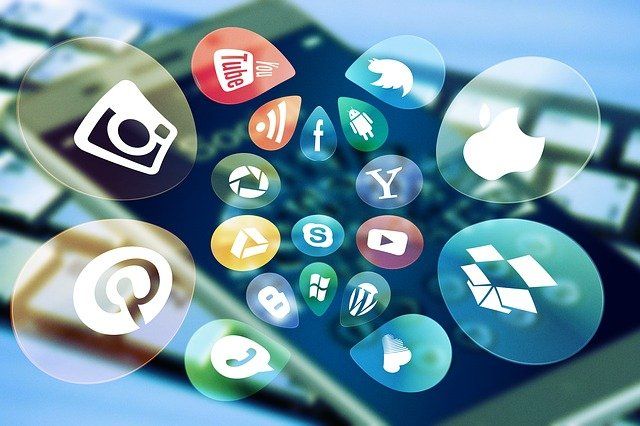Artificial Intelligence in Digital Marketing
The evolution of chatbots responding to client enquiries is the most well-known application of artificial intelligence in digital marketing. With deeper data analysis, artificial intelligence aspires to surpass humans in spotting marketing trends.

1. ARTIFICIAL INTELLIGENCE IN MARKETING MARKET
AI transforms today’s digital world from Google's Voice Search and RankBrain to an excellent Amazon recommendation system. Artificial intelligence strives to take over humans in recognizing marketing trends with deeper data analysis. Brands and digital giants are automating their digital marketing services by introducing AI to save resources and time.
The first or most well-known application of artificial intelligence in digital marketing comes with the evolution of chatbots responding to customers' queries. According to Salesforce, in 2018, only 29% of marketers used AI, and the number raised to 85% by 2020. Further, the spending on AI solutions, including hardware, software, and related services, is forecasted to approach $340 billion, as reported by IDC. SEMrush found that 40% of marketing and sales companies prioritize AI in their business over other departments. Diving deeper, Demandbase stated that businesses with AI solutions see 59% better close rates, 54% more engagement, traffic, 58% more revenues, and 52% more conversions than businesses using traditional marketing.
Businesses use AI in two ways to boost their digital presence. The first way runs in the background where marketers use AI to expect the future demand of their product or service by offering programmatic ads. The other is on the front-end facing customer side, where a marketer uses AI for better user experience, strengthening the brand with higher sales. 75% of organizations using AI in marketing reported enhancing customer satisfaction by over 10%.

2. THE RELATION BETWEEN AI AND DIGITAL MARKETING
Years before, marketing experts hesitated to deploy AI strategies in their marketing and sales practices. Brands like Amazon, Nike, and Alibaba successfully introduced AI in their marketing and earned high revenues.
Alibaba launched a fashion AI store to streamline the fashion experience for customers. It helped them generate high customer engagement and sales. Further, Amazon is considered one of the leading companies applying a personalized recommendation system. It tracks customers’ search history and suggests similar products based on their personalized experience. They also use intelligent systems to support dynamic pricing (reduce or raise prices according to the need to generate high sales). This approach gives them a competitive edge of earning more customers than their competitors.
3. MAJOR GEARS OF AI-POWERED MARKETING
Some major AI marketing elements that are highly powerful and attractive in terms of generating high sales and greater user engagement are given as:
- Big Data
Big data is the collection of data from multiple sources. It is an influential factor in starting digital campaigns as it assists marketers in fragmentizing complex data and sending personalized information to the customers at the right time via a social media channel. - Emotional AI
AI solutions for digital marketing are efficient enough to interpret customers' emotions and talk to them accordingly. It is an amazing AI feature that uses emotional AI to attract more customers and engage them for a longer period. - Digital Marketing Machine Learning
ML techniques are helping marketers to get useful insights from big data and use it for future recommendations and suggestions. Machine learning tools are assistive in identifying market trends and predicting their product/service demand. In this way, ML in marketing allows businesses to offer customer-oriented services via worthy operations.
4. FIVE WAYS COMPANIES USE AI IN DIGITAL MARKETING FOR BETTER CUSTOMER SERVICE
When it comes to user experience using AI, some major and prominent factors arise that must be considered for better marketing strategies.

4.1. AI Marketing Bot
Chatbot uses AI to determine queries and respond to them accordingly. Chatbots can communicate either in an auditory or textual way; however, the latter appears as a popup window on computer screens. These are also known as messenger bots and were recognized as one of the best marketing tools by 2017. A bot can provide customer service benefits for both customers and brand owners; it gathers the client's data of interest and then, via target messaging, deliver targeted messages in a humanoid manner. Chatbots even move customers from sales funnels by asking them particular questions regarding their demand to find and share best-fit products with them.
NAB (National Australia Bank) introduced a chatbot as a virtual banker to save their (customer) time on administrative tasks. It answers clients’ queries of more than 1300 variations on over 200 questions 24/7: hence, sharing real-time answers.
Sephora is another example of a brand using an AI chatbot that gives beauty assistance to its clients and suggests the best-fit cosmetic product based on their demands. Sephora virtual artists allow their potential clients to test products including lipsticks, pallets, or eyeshadows and identify their facial features. After it, the software uses AR to apply the chosen cosmetic product on the client's picture to share their real-time makeup look; it can also suggest and apply eyeshadows of its wish on the customer's face by understanding their skin tone. The marketing companies can prefer Facebook tools or wit.ai.bot to prepare their messenger bots in supposed conversations to allow them to learn from various contacts.
4.2. Predictive and Targeted Content Marketing AI
AI can also be sued to gather data about customers and their perspectives and be used as chatbots for answering questions. Artificial intelligence uses this data to predict future behaviors and send more customer-oriented messages. The content might be shared in several ways, including web pages, email, or dynamic content.
It is not easy to generate quality content as it is time-consuming and requires effective marketing techniques. AI sends the right emails automatically via dynamic content and determines the type of content based on customers' past experiences. AI knows the web pages a customer scrolled or blog posts in which they showed interest and emails that they opened more than once. AI uses churn predictions to recognize the customers who were their popular clients and now showing less interest in their brand. After it, AI helps brands by sending personalized content that was appealing to them in the past to reengage them.
AI writes articles just like humans, and it's pretty complex to distinguish both. It generates more specific content like email subject lines and social media ads written by Persado, an AI-content generator, with 100% accuracy. It eliminates the need for an employee to generate content after knowing and understanding their client's nature.
Zeta and Phrasee are other major email marketing tools using AI in marketing to generate perfect content. Phrasee can generate content with over 95% accuracy, surpassing humans in writing email subject lines. Following tailored content, artificial intelligence also helps advertisers optimize their email campaigns to expand productivity. Eventually, artificial intelligence in digital marketing helps marketers to engage more customers via better analyzing content, subject quote, design, and images to increase their conversions.
4.3. Artificial Intelligence with AR and VR
When AI technologies are combined with augmented or virtual reality, it offers an extraordinary user experience. For instance, Coca-Cola joined AI and AR using glasses or a headset by overlying computer graphics against real-world viewpoint within several bottling plants. It allows service providers to get knowledge from the gear being serviced. Moreover, this technology helps them see the view and makes it simpler for experts to perform renovations even in remote locations. It offers interesting ways to interact with a brand more effectively. AI with AR/VR makes a strong connection between user and brand and refreshes user experience, resulting in a greater sense of loyalty among them.

4.4. Image Recognition Technology
Image recognition tool as an AI business software help improves customer experience. The given feature can be seen on Facebook, where one is automatically tagged in a post based on image recognition. Further, Macy's, a major retailer, introduced Macy’s Image Search app, allowing customers to upload an item's picture to find something relevant to it on Macy's inventory.
4.5. Personalized Recommendation: AI in Advertising
Traditional marketing methods like direct mail and advertising are no more effective. One of the reasons is that today's customers demand brands to customize their demographics, locations, and interests. Many ignore non-personalized marketing practices, including emails. Accenture, a management consulting firm, reported that over 40% of customers switched brands due to poor personalization and trust issues by 2017, while 43% preferred to purchase brands with high personalization strategies. So, recommendation engines are also becoming more sophisticated than ever before. For instance, Amazon keeps a record of:
- Every purchase a customer made
- Browsing history based on finding a product or a service
- Items the buyer wished to get
- Music and TV shows played
- Apps download history
- Products the customer-rated and their reviews
- Devices used to download eBooks or for watching a movie
- Everything asked from Alexa
A project, Rosetta, developed by Facebook researchers focused on leveraging AI and ML solutions in understanding content in photos and videos. It improves user experience by better understanding the content quality and showing similar content in their news feed. This predictive modeling, also known as predictive analytics, share valuable information that’s near to impossible without technology.
5. Five ARTIFICIAL INTELLIGENCE MARKETING COMPANIES
5.1. Amplero
Famous for: The company in Seattle, Washington, is a self-defined AI marketing center that allows consistent customer connections across different networks. It is one of the AI marketing companies that provides exceptional views of existing consumer data, enabling marketers to run further trials and share new patterns with the team to develop new strategies.
Industrial impact: A mobile carrier company working with Amplero observed nine times more profits per user in the initial month, and these revenues increased seven-times after three months.
5.2. GumGum
Famous for: The company located in Chicago and Santa Monica involves developing ACV (applied computer vision) technology that enables marketers and advertisers to run AI ads strategically. Their AI technology scans images and videos over several platforms to help marketers offer more personalized advertisements with increased engagement and brand publicity.
Industrial impact: A big number of Fortune 100 companies, like T-Mobile, Johnson & Johson, and Miller Lite, are working with GumGum.
5.3. Sizmek
Famous for: This Austin, Texas's one of the AI marketing platforms provides insights for companies to understand customer data better and ultimately produce personalized campaigns and content. Their artificial intelligence in digital marketing comes with the efficiency of analyzing billions of data informational points to foresee the right period, right message, and right content for boosting conversions.
Industrial impact: Chief visionary at Sizmek, Nikos Acuna, stated that "We use AI to uncover and act on previously hidden dimensions and connections between brands and their customers. Because of that, the experience delivered by each ad impression is enhanced."
5.4. Albert Marketing
Famous for: Albert technologies in New York makes AI solutions for agencies and brands. The software tracks the entire cycle of customer interests, including Facebook, Google ads, YouTube, Gmail, or Instagram activity. Albert AI marketing company executes campaigns from start to end for sharing excellent perceptions from cross-channel data.
Industrial impact: Albert's client, Harley-Davidson, saw a 556% rise in website traffic, and credit goes to Albert with 40% motorcycle sales.

5.5. Google
Famous for: Google, the company in Mountain View, California, is responsible for creating search ads and enables marketers to write fifteen headlines and four description lines. It is one of the companies using AI and machine learning tools help determine perfect combinations for a given search question. Also, it optimizes local campaigns and ad placements.
Industrial impact: GittiGiduiyor, an eBay brand, uses Google's Smart Shopping campaigns to manage its ads. The company observed a 28% boost-up return on its spend rate with a 4% sales bump.
6. Six AI MARKETING TOOLS FOR BETTER SALES
Different tools are available now to target different customers with great marketing solutions. AI is beneficial for even small businesses with the least marketing resources. Moreover, SEO-based AI marketing tools help big giants to compete with their competitors via outranking SERPs.
6.1. Google Cloud AI
Google Cloud AI helps create personalized chatbots or talent networks. It is a safer and seamless tool used for artificially intelligent services and products. It shares a pre-trained model on its cloud platform to integrate everything online quickly.

6.2. Market Brew
Market Brew is one of the SEO tools for experts, which helps them better recognize the search engine's strategies. Most engines take up to sixty days to accept changes, but change ranking is possible within one and half hours with Market Brew.
6.3. Emarsys
AI B2B marketing is all about personalization in advertising strategies. The brand's ability to customize content for different users for better interaction is everything on the world web full of competition. Emarsys, an omnichannel platform, help businesses to rank their scale via improved impressions and AI-driven sales.
6.4. Siftrock
Siftrock is an exceptional email marketing tool with artificial intelligence solutions. It is a marketing automation AI tool that can automatically engage customers by delivering specific messages.
6.5. Blueshift
This tool tracks individuals based on their interaction history. Blueshift shares the best marketing actions for specific customers to drive sales with high revenue generation.
6.6. Zoomph
Social media is influencing the marketing strategies of the recent age. Zoomph AI marketing tool measures sponsorship, ROI, and social behaviors on social platforms. Plus, it tracks the latest trends regarding a specific brand to follow for enhanced engagement and boost sales with social media awareness.
7. THE NEGATIVE OF ARTIFICIAL INTELLIGENCE FOR MARKETERS
What is the future of digital marketing with AI? Companies use AI for automating their digital marketing tasks. However, the negatives of AI in marketing are not greater; some think that with AI, they have more time to focus on other significant tasks, but in reality, its monitoring and maintenance are more time-consuming. It will also increase the workload on the employees to implement new updated terms and processes to keep their system up to date. There are also some challenges that marketers should consider before implementing artificial intelligence in digital marketing.
7.1. Privacy
Consumers are cracking down on how enterprises use their data. Marketing professionals should use their customer's data ethically and comply with GDPR standards. AI may put its users at high risk of reputation damage unless it is programmed accurately.
7.2. Training Time and Data Quality
AI tools must be trained to take the right actions for achieving high marketing goals. They require time, customer preferences, understanding of overall context, and historical data to learn organizational goals. Further, it needs quality data to be trained rightly; otherwise, it will fail to make optimal decisions reflecting customer demands and reducing the service value.
7.3. Getting Buy-In
It can be complex for marketers to demonstrate the impact of AI involvement in businesses. While KPIs like ROI are easy to quantify, showing the potential of AI in marketing for boosting brand reputation. So, the teams should know the measurement abilities to count the benefits with AI investment.
However, its negatives are much less than the benefits of AI in making exceptional marketing strategies.
8. FUTURE OF DIGITAL MARKETING
Ignoring the possible benefits and opportunities of AI in marketing means that the organization will definitely lag behind its competitors and eventually go out of the screen. Advanced AI marketing solutions make technology user-friendly and easy to implement in the existing system.



